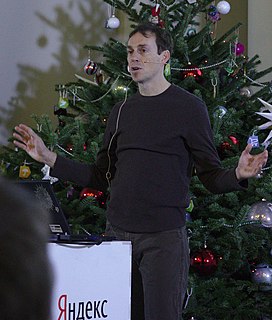A Quote by Andrew B. Newberg
There is a built-in mechanism by which we respond fairly strongly and fairly negatively to somebody who is being negative or to somebody who is simply disagreeing with us, in which case it's a very unhappy position for our brain to be in. Our brain does not want us to be wrong. Because that has very dire consequences in terms of our overall survival.
Related Quotes
We have allowed brain thinking to develop and dominate our lives.
As a consequence, we are at war within ourselves.
The brain desiring things which the body does not want, and the body desiring things which the brain does not allow; the brain giving directions which the body will not follow, and the body giving impulses which the brain cannot
Many of our actions degrade our habitat because we undertake them in order to reach goals whose allure blinds us to myriad dire consequences. In order to fuel our complex civilizations, we are lacing our planet's atmosphere with carbon dioxide, a greenhouse gas that, if it has not already begun doing so, will soon warm the Ice Age climate to which we owe our very existence.
There's a lot of research that indicates the brain rewards us for multi-tasking by giving us a shot of neurochemicals whenever we start a new task. Our brain rewards us even as our performance in every task degrades. We don't even notice that our performance is bad. We don't care. We feel like masters of the universe because our brain is chemically rewarding us for multi-tasking.
Our assaults on the ecosystem are so powerful, so numerous, so finely interconnected, that although the damage they do is clear, it is very difficult to discover how it was done. By which weapon? In whose hand? Are we driving the ecosphere to destruction simply by our growing numbers? By our greedy accumulation of wealth? Or are the machines which we have built to gain this wealth-the magnificent technology that now feeds us out of neat packages, that clothes us in man-made fibers, that surrounds us with new chemical creations-at fault?
These days, more than any other time, we are worried about our personal life, our private life. When we talk about our private life, it means our home, our body even. It seems that when we want to have calmness in this world, we make a wall around us. This gives us a very calm environment, and when we feel that somebody is intruding into that, it makes us very angry and we feel we have to do something about it.
Men ought to know that from the brain and from the brain only arise our pleasures, joys, laughter, and jests as well as our sorrows, pains, griefs and tears. ... It is the same thing which makes us mad or delirious, inspires us with dread and fear, whether by night or by day, brings us sleeplessness, inopportune mistakes, aimless anxieties, absent-mindedness and acts that are contrary to habit.
Put simply, behavioural economics argues that human beings' decision-taking is guided by the evolutionary baggage which we bring with us to the present day. Evolution has made us rational to a point, but not perfectly so. It has given us emotions, for example, which programme us to override our rational brain and act more instinctively.
I actually am fairly uncomfortable about it, even if our firm stipulation was that they cannot tell us what to do. We are simply doing what we do anyways - securing software - and they have no say in the matter. I try to convince myself that our grant means a half of a cruise missile doesn't get built.
Avatar is the most high tech film in terms of its execution, dealing with essentially a very low tech subject; which is our relationship with nature...and in fact the irony is that the film is about our relationship with nature and how our technological civilization has taken us several removes away from a truly natural existence and the consequences of that to us.
Let us, then, take our compass; we are something, and we are not everything. The nature of our existence hides from us the knowledge of first beginnings which are born of the nothing; and the littleness of our being conceals from us the sight of the infinite. Our intellect holds the same position in the world of thought as our body occupies in the expanse of nature.
Since functional brain imaging first emerged, we have learned that there aren't very many brain regions uniquely responsible for specific tasks; most complex tasks engage many if not all of the brain's major networks. So it is fairly hard to make general psychological inferences just from brain data.




































